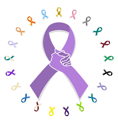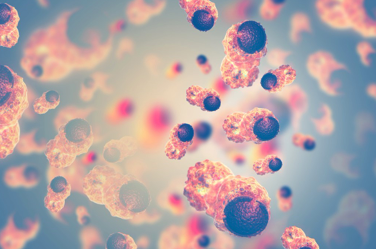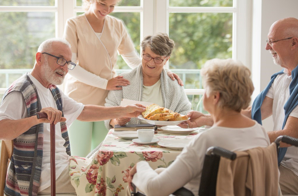Cancer Information
Cancer is a term used for diseases in which abnormal cells divide without control and are able to invade other tissues. Cancer cells can spread to other parts of the body through the blood and lymph systems.
There are more than 100 different types of cancer. Most cancers are named for the organ in which they start - for example, cancer that begins in the colon is called colon cancer; cancer that begins in basal cells of the skin is called basal cell carcinoma.
Cancer types can be grouped into broader categories. The main categories of cancer include:
- Carcinoma - cancer that begins in the skin or in tissues that line or cover internal organs.
- Sarcoma - cancer that begins in bone, cartilage, fat, muscle, blood vessels, or other connective or supportive tissue.
- Leukemia - cancer that starts in blood-forming tissue such as the bone marrow and causes large numbers of abnormal blood cells to be produced and enter the blood.
- Lymphoma and myeloma - cancers that begin in the cells of the immune system.
- Central nervous system cancers - cancers that begin in the tissues of the brain and spinal cord.
Not all tumors are cancerous; tumors can be benign or malignant.
- Benign tumors aren't cancerous. They can often be removed, and, in most cases, they do not come back. Cells in benign tumors do not spread to other parts of the body.
- Malignant tumors are cancerous. Cells in these tumors can invade nearby tissues and spread to other parts of the body.
The spread of cancer from one part of the body to another is called metastasis. Some cancers do not form tumors. For example, leukemia is a cancer of the bone marrow and blood.
How did I get cancer?
Although every patient and family member wants to know the answer to this question, the reason people develop cancer is still not well understood. We don’t know why some people get cancer and others don’t. The length and amount of exposure to cancer causing agents can increase the chances of developing cancer. For example, as exposure to cigarette smoking increases, the chances of developing lung cancer also increase. Genetics also plays an important role in whether an individual develops cancer.
What’s next?
Many unpleasant thoughts and images occur when someone is told that chemotherapy or radiation therapy is part of their treatment; however, there are many good reasons to be optimistic as the journey towards surviving cancer begins. Medicine and medical research have made great strides in treating cancer and in making it more tolerable, both physically and emotionally.
No one would call cancer a normal experience, but by proactively managing aspects of your treatment, you can maintain a sense of normalcy in your life. Fighting cancer is not a challenge you face alone. It's a team effort that involves family, friends, and your healthcare team. Don't overlook the strength that can come from having your support network by your side.
Newly Diagnosed - Diagnosis and Staging
Diagnosis is not the same as detection. Cancer may be detected when a patient or doctor recognizes symptoms or abnormalities, such as a lump or growth. After a cancer is detected, it still must be carefully diagnosed. A diagnosis is an identification of a particular type of cancer. When making a diagnosis, the initial signs and symptoms are investigated through a variety of tests in order to identify whether cancer is causing them and, if so, what type of cancer it is.
What is a cancer stage?
Following a diagnosis of cancer, the most important step is to determine the stage of cancer. Stage describes how far the cancer has spread. Each stage of cancer may be treated differently. Generally, the lower the stage, the better the treatment outcome.
- Stage 0 – pre-cancer
- Stage 1 – small cancer found only in the organ where it started
- Stage 2 – larger cancer that may or may not have spread to the lymph nodes
- Stage 3 – larger cancer that is also in the lymph nodes
- Stage 4 – cancer in a different organ from where it started
How is prognosis determined?
The probable course and outcome of cancer is called the prognosis. There are many factors that help determine a prognosis. Some include:
- Your age
- Your level of physical fitness
- Size of your cancer
- Stage of your cancer
- Aggressiveness of your cancer (cancer cells that are growing and dividing rapidly are considered more aggressive)
How is cancer diagnosed?
Diagnosing cancer involves the use of a variety of tests that provide details about the abnormal cells. Information is gathered in order to identify these cells as malignant (cancerous) or non-malignant (non-cancerous), and if they are malignant, to determine how serious (aggressive) the particular cancer cells are. There are many types of tests specifically designed to evaluate cancer:
- A pathology report is based on observation of abnormal cells under a microscope.
- Diagnostic imaging involves visualization of abnormal masses using high tech machines that create images, such as x-rays, computed tomography (CT), positron emission test (PET), magnetic resonance imaging (MRI), and combined PET/CT.
- Blood tests measure substances in the blood that may indicate how advanced the cancer is or other problems related to the cancer.
- Tumor marker tests detect substances in blood, urine, or other tissues that occur in higher than normal levels with certain cancers.
- Special laboratory evaluation of DNA involves the identification of the genetic make-up—the DNA—of the abnormal cells.
Support - Caregivers
Most people will become caregivers—or need one— at some point in their lives. A caregiver is anyone who provides basic assistance and care for someone who is frail, disabled or ill and needs help. Caregivers perform a wide variety of tasks to assist someone else in his or her daily life, for example, balancing a checkbook, grocery shopping, assisting with doctor’s appointments, giving medications, or helping someone to eat, take a bath or dress. Many family members and friends do not consider such assistance and care “caregiving”—they are just doing what comes naturally to them: taking care of someone they love. But that care may be required for months or years, and may take an emotional, physical and financial toll on caregiving families.
For some people, caregiving occurs gradually over time. For others, it can happen overnight. Caregivers may be full- or part-time; live with their loved one, or provide care from a distance. For the most part, friends, neighbors, and most of all, families, provide—without pay—the vast majority of care.
Effective Caregivers
- Serve as advocates for their patient
- Understand the patient’s needs to socialize
- Become familiar with insurance and financial matters
Helping someone go through a cancer diagnosis, treatment, and recovery requires understanding, encouragement, patience and energy. Caregivers become part advocate, nurse, organizer and financial analyst in addition to maintaining their other responsibilities. Caring for someone with a life-threatening disease can be emotionally and physically draining. Caregiver burn-out can occur even when caring for a dearest loved one. For this reason, you are encouraged to:
- Take control of your life. You must remember to continue to live your life and not allow it to completely revolve around your loved one’s illness.
- Remember to take care of and be kind to yourself. The job you are performing is difficult and can be taxing. It is important for you to have personal quality time, to do what you like, for you.
- Be aware of how you are feeling emotionally. Depression is common for individuals in your position. Seek professional help immediately if you are experiencing signs of depression.
- Accept assistance from others when offered and make specific suggestions as to what they can do.
- Get educated. The more you know about your loved one’s condition, the more empowered you will feel.
- Support your loved one’s independence. Caring for somebody does not necessarily entail doing everything for them. New technologies and ideas provide options that help promote a healthy level of independence.
- Listen to your heart. Your gut instincts most often lead you in the right direction.
- Allow yourself to grieve. Then allow yourself to move forward and dream of new possibilities and experiences.
- Seek support from other caregivers and obtain strength and comfort in the understanding of others in similar situations. You are not alone.
Find the best medical treatment team for you.
Choose a doctor based not only on the recommendations of professionals, but also on the suggestions of other people with cancer. If you have a choice, visit each doctor once before deciding which one will work best with you.
Ask questions. Seek information.
Most people find it helpful to write down questions. Bring a friend or relative with you when you see the doctor. Your friend can help you ask questions as well as remember and understand new information.
Take your time.
When you have an important decision to make, such as a choice of doctor, treatment, or surgery, you almost always have a few weeks to think it out and confer with others.
Consider joining a support group.
Support groups offer interaction with individuals who have had experiences similar to yours. They can give you reassurance as well as important facts based on first-hand experience.
Take good care of your body.
Find out about good nutrition, relaxation techniques, and anything else that helps your body heal.
Treat yourself well.
Celebrate triumphs, no matter how small they may seem. Find any excuse to reward yourself with a massage, a walk in the park, or something else that will give you peace of mind and make your life better.
Make trips fun.
Combine a required trip to the physician or therapist with a fun activity. Make arrangements to go out to lunch, stroll a mall, or do whatever he or she would like to do.
Keep your friendship a two-way street.
Although you will no doubt spend time listening to your friend, talking about your own life (both good and bad) will allow your friend to feel needed and to contribute something in return.
Touch or hug your friend at every appropriate opportunity.
People who are sick rarely get enough hugs. Cancer is not contagious. Greeting cards, postcards and humorous emails are another way to express your love. Avoid "Get Well Soon" messages unless that is the case for sure.
Use the same language as your friend uses.
If he says cancer, you can say cancer. If he says tumor or malignancy, use those words.
Everybody's battery needs recharging.
If you know someone caring for a loved one with cancer, take over her duties for an afternoon to give her a chance to do whatever she wants to do. If you are that caregiver, give yourself adequate time off. Leave any guilt you might have behind and have a good time.
A positive attitude can play an important role in how you react to treatment and the challenges that it may bring. Our goal is to provide you with tools that will inspire you with ways to go through your cancer journey with grace, dignity and an attitude filled with hope for the future.
Affirmations
Affirmations are positive thoughts that celebrate you and your spirit. These brief phrases are designed to help you feel stronger and more in control. We encourage you to read through this list and pick the affirmations that speak most to you about your situation. You may want to pick a different affirmation daily and repeat it several times throughout the day. You may want to write your own affirmations, or you may want to rely on phrases and verses from the Bible.
I see myself as a healthy person in love with life.
I lovingly tend the garden of my mind.
I pull the negative weeds and make room for positive affirmations to grow.
A life filled with wonder is a life lived.
My spirit can never be taken from me,
for it is the part of me that is eternal.
Whenever a door closes in my live, at least three more new doors open.
I am safe I am open and receptive to new fulfillment in my life.
I have all the energy to accomplish everything I put my attention to.
I know that even difficult lessons are opportunities for positive change.
Everything is working out for my highest good.
No matter where I am or what I am doing, there is beauty around me.
True living is being able to see that beauty and to take it in.
I am an expression of unlimited good.
What I choose to think and do today has an effect on my future.
I am a powerful creator.
I do matter - to myself and to God.
I am deeply loved and cherished right now.
I am an eternal, spiritual being having a human experience.
My soul rejoices in this experience.
Life’s unfolding invites my participation.
Ultimately, only I can choose my options.
My personal power increases when I accept and embrace this truth.
Usually, if I am thankful for what I have,
I don’t have time to focus on what I don’t have.
I am patient and kind with everyone I meet each day.
I am a person I really enjoy living with.
I rejoice in the successes of others, knowing there is plenty for us all.
I am doing the best that I can. Each day gets easier.
I am deeply grateful for all the love in my life.
Kindness starts with kindness towards myself.
I have dozens of opportunities a day to laugh at myself and only a few to laugh at others. Only a fool would choose the lesser when the greater is so present.
It’s important to let myself experience the grief I feel when something has ended.
Attitude determines how I handle and survive life.
The Gift of Cancer
You may encounter the phrase, “The gift of cancer.” It may take some time, but you may come to see it this way,
After you’ve been frozen in your tracks with the diagnosis, perhaps sometime during the treatment period - or maybe even months after your recovery, you will discover “the gift.” Every crisis contains the seed of opportunity. Open your spirit as you would open the earth to plant a flower’s seed. Give yourself permission. If you will allow yourself, you can find beauty in any beast, even cancer.
Each person’s “gift” differs. Cancer may be your opportunity to discover a community of caring, compassion and love made up of fellow cancer patients, sensitive counselors and dear, dear friends. The resounding grace of these individuals impacts the very essence of the human spirit. You may feel totally unprepared for the unconditional love that is available during your encounters with members of your healing community. If your own support system is small, reach out to a cancer support group. While some expect a somber, serious setting, they are often surprised to discover bright, hopeful personalities that work hard to turn pain and numbness to laughter.
Your journey to these remarkable resources requires no suitcase or ticket. The only prerequisite is an openness of spirit - an attitude that seeks to find blessings in adversity. Prepare to be filled with faith and interior joy. Always seek the light: the darkness will dissipate. By being mindful of the present moment, you likely will discover a totally different world filled with abundance.
Though most likely your prognosis is good, you cannot help but question your mortality. Permit yourself to step out of the immediate terror and assess your situation somewhat objectively. Draw upon your personal faith, confidence in your medical treatment plan, and whatever else you value for strength. A world of opportunity awaits...and your cancer diagnosis gives you “permission” to go exploring!
What have you always longed to do, but haven’t? What old friends have you been meaning to see, but haven’t? What relationships would you like to repair? Take advantage of cancer’s wake-up call, and start living your life as only you can.
Want to act a little crazy? Want to do something out of character? Want to pursue a long lost dream? The gift of cancer gives you permission. It’s amazing what you can get away with now - if you really want to. Chances are what you want to do is not that outrageous - it’s only convention and habit that have prevented you from stepping out of your self-imposed boundaries.
Granted, practicalities may deter you from following every whim to its fullest. But allow yourself to consider the possibilities. Dreams frequently have a way of making reality more palatable. Readjust your life as you feel you are able. Make plans for the future - because you do, indeed, have a future. Even those with the most dismal prognosis, can and should look forward. Hope always exists. Don’t insist that every moment be perfect, but attempt to see the most positive aspect of every moment.
Are you cherishing each moment of your life or is it a rushed blur? When was the last time you felt awestruck by a magnificent sunrise or sunset? Have you recently savored the warmth of sunlight on your face or the coolness of wind cradling your body? Do you take time to watch the stars sparkle and dance in the sky or what about the ever-changing panorama of cloud sculpture? The gift of cancer can bring a remarkable clarity and closeness with the environment. I now have a clear appreciation of the Native American blessing “draw strength from Mother Earth while accepting peace from our Father in Heaven.” Simply allow yourself time to commune with nature, and you are apt to find yourself filled with wonder, astonishment and peace.
“Inhale peace; exhale despair.” “Breathe in hope; blow out fear.” “Inhale healing; exhale disease.” “Breathe in love; blow out turmoil.” Mindful meditations. Sensory awareness. Healing touch. The gift of cancer puts you in touch with an entire community of caring individuals eager to equip you with tools for coping with everyday stress that others may never know exist.
Now may be a time that you learn how much you are truly loved and cherished. Those “others” who have avoided a life threatening diagnosis may never experience the outpouring of affection and respect that you likely will. Let yourself discover how many people truly love and admire you. Harness the energy of those loving thoughts that surround you - both near and far. Embrace this affection as an integral part of your healing.
Let yourself be open to the love that is waiting to surround you. Love is everywhere...waiting to be tapped. Don’t be afraid to tell those close to you how much you love them. Chances are they need to hear those words as much as you need to say them. Likely, you will be astonished at the extent of your support system. Now is not a time for isolation. Express your feelings like you never have before. Always remember: hugs are wonderful healing tools. Allow relationships to strengthen and deepen. Now is also a time when someone close may disappoint you. Be careful. Don’t let an unfortunate incident put you off the path of self-discovery and healing. New friends will emerge if you grant permission. Your circle of caring will continue to expand. Be open. Acquaintances once taken for granted may soon develop into your most cherished friends and soul mates.
On a practical side, learn to become an excellent manager. Delegate. As you are able, allow others to manage your appointments, your home, and your daily needs as you focus on healing. What complications of your life can you release to someone else? Accepting assistance is not a sign of weakness, but rather of strength in that you know who you are - and what you need. In accepting offers of help, you are giving to the giver as much as he or she is to you.
The gift of cancer brings a new awareness of your body; its strengths, its weaknesses. If you use your gift wisely, you’ll learn how to cope with your fluctuating energy reserves. Chronic fatigue was, perhaps, the most difficult “gift” that I had to accept. Hopefully, you will learn the following lesson quicker than I did. Think of your energy level as a bank account. More than ever before in your life, you must replace with rest what you withdraw with activity - or you will soon be overdrawn! Pace yourself. Like many of the gifts, this one translates into your everyday life - long after you complete treatment.
Recognition and acceptance of death as a natural transition of life will likely come to you sooner than most. Yes, confronting your own mortality is uncomfortable. But you must. The gift of cancer can bring a sense of peace and serenity that few know. After you have dealt with the possibility of dying, you are freed to savor the reality of living.
Live, laugh, love as though your life depended on it - it does. Wiggle your toes in a carpet of grass. Be open to the romance of life. Laugh a lot. Cry when you feel like it. Let the child in you emerge. Talk about your dreams, your fears, your expectations. Take time to listen. Discover your source of peace and strength. Spend time there. Touch and be touched.
In the end, it’s love. Cherish yourself and others. Find joy in everyday experiences. Allow yourself peace. Embrace each day.
Carpe diem!
What Cancer Cannot Do
Cancer is so limited…
It cannot cripple love,
It cannot shatter hope,
It cannot corrode faith,
It cannot eat away peace,
It cannot destroy confidence,
It cannot kill friendship,
It cannot shut out memories,
It cannot silence courage,
It cannot invade the soul,
It cannot reduce eternal life,
It cannot quench the spirit,
It cannot lessen the power of God.
Support – Journaling
A person’s cancer journey can be a time of deep reflection, a time for peacemaking and a time to express fears, hopes, and dreams. Often by merely writing about feelings, a person can attain a sense of perspective and inner peace. For this reason, patients are encouraged to explore journaling during their cancer treatment and beyond.
Journaling is a very private experience where you are safe to write about whatever you are feeling. There are no rules other than you shouldn’t worry about the rules of formal writing. “Proper” spelling, punctuation and grammar should not be the focus of your writing. Think of journaling as sharing your feelings with your dearest friend who will never judge you and never think less of you regardless of what you write.
You may organize your journal any way that is comfortable for you. Some people write daily – others only when they feel the need to express themselves. Some journalists divide their journal into sections that range from Feelings to Family Memories to My Favorite Things to Sources of Inspiration and so on. Thus, the journal becomes a resource for empowerment and inspiration as well as therapeutic. Whatever works best for you is what you should do.
Journaling can be a powerful tool toward healing. We hope you will try it
Support – Life After Treatment
Completing treatment for cancer is an accomplishment. You may feel a great sense of relief as some of the anxiety and discomfort subside and the inconvenience is over. After thinking about cancer every waking moment during treatment, you need to resolve a few issues as you begin to recover physically and move on with your life. First and foremost, establish your treatment follow-up strategy and make sure that you feel comfortable with the management of any long-term side effects. Then, find resources to help you cope with financial and emotional issues.
Follow-Up Strategy
Follow-up care is necessary to manage treatment complications and to detect potential cancer recurrence early, when it is most treatable. Discuss your post-treatment strategy in detail with your medical team to determine your follow-up schedule. Also, find out if your post-treatment strategy includes periodic tests. For example, your follow-up care may require periodic CT scans, MRIs or X-rays to monitor and note any suspicious changes. Similarly, if your disease is associated with a blood marker, you may have periodic blood tests to monitor blood marker levels. In addition to periodic tests, you may want to discuss your prognosis as well as symptoms of recurrence that are cause for further follow-up. Also, make sure that you have established a way to contact your doctor or nurse as additional questions and concerns arise.
Long-Term Side Effects
Long-term side effects from treatment may be minor or imposing. Understanding what side effects may occur and determining the best way to manage these side effects on a permanent basis is important. Your treating doctor may not be a specialist in the management of long-term side effects so you may request a referral. For example, if the surgical treatment of your disease has left you physically challenged, your follow-up care may require a physical therapist. Or, if you have had a lymph node dissection, the management or prevention of lymphedema may best be handled by someone other than your surgeon.
Post Treatment Financial Issues
Cost of treatment may impose an ongoing financial stress and burden. Post-treatment financial issues may include disputes with your insurance, as well as debt incurred from out of pocket expenses or an inability to work during treatment. Patient advocate organizations offer valuable information to help patients with these issues. For more information about insurance issues, job discrimination or patient assistance programs, go to www.patientadvocate.org or other patient advocate organizations.
Support
After completing cancer treatment, you may feel elated and relieved as you recover and side effects diminish. Although your life may return to normal, the unknown and the statistics may still weigh on your mind from time to time. To cope with emotional issues, you may wish to seek professional support, family support, as well as support from other patients with your disease. Patients recommend reading other patient stories, telling your story and researching breaking news concerning your disease. These processes have been facilitated by the evolvement of the Internet’s disease specific sites, bulletin boards, and chat rooms. Patients also indicate that community support groups are a valuable resource for emotional support. Acknowledging your experience through these outlets may provide some sense of relief and validation.
Defining your post-treatment strategy, understanding management of long-term side effects, seeking support for financial issues, and coping with emotional issues are all important components of your post treatment plan. Since thinking about cancer may consume you as you go through treatment, letting go and moving on may be difficult. However, an effective post-treatment strategy may help you cope with emotional and physical side effects, as well as facilitate early identification of cancer recurrence when it is most treatable.
Support – Movement & Exercise
Embarking on a serious exercise program while undergoing cancer treatment is usually not a good idea. However, maintaining energy for your current daily activity level is important as is regaining any lost strength. Always check with your physician before beginning any exercise program to determine what activity level is most appropriate for you. Be sure to drink plenty of water. Staying well hydrated is always important to overall health, but even more so during treatment. Listen to your body and don’t over exert yourself.
Benefits Often Include
- Stress reduction
- Improved sleep
- Maintenance or strengthening of cardiovascular system
- Enhanced flexibility and range of motion
- Reduced fatigue
- Relaxation
- Self-confidence and an enhanced feeling of wellness
You may not realize it, but even light to moderate walking can help increase energy levels and boost self esteem. Many patients find that exercise helps reduce feelings of anxiety and depression as well. Be sure to start slowly after informing your healthcare provider.
Movement Ideas
- Make the most of your daily activities by incorporating exercise.
- Take the stairs instead of the elevator
- Park farther away
- Go down every aisle in the grocery store - whether you need to or not!
- Stroll the mall. You’ll enjoy a controlled environment, people and plenty of places to rest should you tire.
- Work out in water. It is gentle on your joints and you won’t become over-heated. (be sure to use sunscreen if your pool is outside).
- Try Tai Chi, Qi Gong or yoga. These centuries-old forms of exercise incorporate rhythmic breathing and relaxation techniques with gentle movements.
- Gardening can be a nurturing experience. Once again, protect yourself from potential sunburn and insect bites.
- Find something that you enjoy.
Contact Info
3700 Bellemeade Avenue Suite 118
Evansville, IN 47714
Phone: (812) 598-7910
contact@chemobuddies.org










